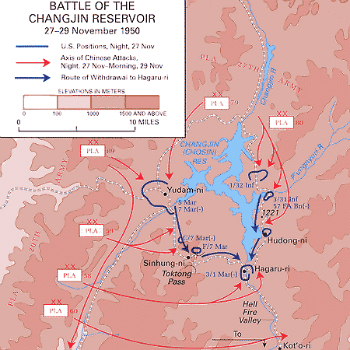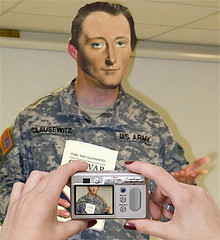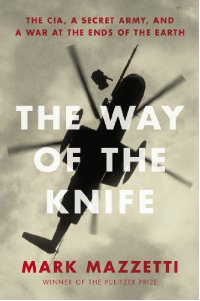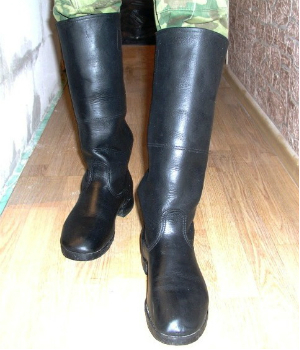Thomas E. Ricks's Blog, page 115
April 11, 2013
Body of Lt. Col. Don Faith, a key figure in the Chosin campaign, is found in North Korea and brought home after 63 years

I always read the
Pentagon casualty notices and MIA notices. This one jumped out at me yesterday,
as it would to anyone familiar with the history of the Chosin Reservoir campaign.
Lt. Col. Don Faith,
Jr. was the unfortunate leader of one of the biggest disasters in American
military history, taking over command of the Army regiment on the east side of
Chosin after the commander of the 31st Infantry Regiment was killed and the
other two battalion commanders were badly wounded. The regiment, badly
outnumbered and hampered by inept general officers, suffered a 90 percent
casualty rate. Its colors now are displayed in Beijing, I am told.
However, the
sacrifice of the Army regiment bought much-needed time for the Marine division
consolidating on the west side of the reservoir.
Soldier Missing from Korean War Identified
The
Department of Defense POW/Missing Personnel Office (DPMO) announced today that
a serviceman, who was unaccounted-for from the Korean War, has been identified
and will be returned to his family for burial with full military honors.
Army
Lt. Col. Don C. Faith Jr. of Washington, Ind., will be buried April 17, in
Arlington National Cemetery. Faith was a veteran of World War II and went on to
serve in the Korean War. In late 1950, Faith's 1st Battalion, 32nd Infantry
Regiment, which was attached to the 31st Regimental Combat Team (RCT), was
advancing along the eastern side of the Chosin Reservoir, in North Korea. From
Nov. 27 to Dec. 1, 1950, the Chinese People's Volunteer Forces (CPVF) encircled
and attempted to overrun the U.S. position. During this series of attacks,
Faith's commander went missing, and Faith assumed command of the 31st RCT. As
the battle continued, the 31st RCT, which came to be known as "Task Force
Faith," was forced to withdraw south along Route 5 to a more defensible
position. During the withdrawal, Faith continuously rallied his troops, and
personally led an assault on a CPVF position.
Records
compiled after the battle of the Chosin Reservoir, to include eyewitness
reports from survivors of the battle, indicated that Faith was seriously
injured by shrapnel on Dec. 1, 1950, and subsequently died from those injuries
on Dec. 2, 1950. His body was not recovered by U.S. forces at that time. Faith
was posthumously awarded the Medal of Honor -- the United States'
highest military honor -- for personal acts of exceptional valor during
the battle.
In
2004, a joint U.S. and Democratic People's Republic of North Korea (D.P.R.K)
team surveyed the area where Faith was last seen. His remains were located and
returned to the U.S. for identification.
To
identify Faith's remains, scientists from the Joint POW/MIA Accounting Command
(JPAC) and the Armed Forces DNA Identification Laboratory (AFDIL) used
circumstantial evidence, compiled by DPMO and JPAC researchers, and forensic
identification tools, such as dental comparison. They also used mitochondrial
DNA -- which matched Faith's brother.
Mission command is harder to do than the Army thinks -- and requires a lot of inputs

By
"Misha N. Komand"
Best
Defense guest correspondent
How can we really enjoy the benefits of mission
command without the inputs? You don't just 'do' mission
command (just as you don't just 'do' Army design methodology).
The Germans didn't just 'do' Auftragstaktik.
No, it was built on a culture that held junior
officers on up to rigorous accounting of academic and military ability. The
Army thinks it can incorporate the benefits of an idea by simply incorporating
(or poaching) the good terms or ideas of others, and not have to pay the price
in selecting and educating the right officers. There will be no true mission
command without a cultural change starting with accountability in education
(centering on military history) and better selection and shaping of the officer
corps.
"Misha N. Komand" is
an active duty Army officer serving on the periphery of the American dream.
Tales of the Afghan military: Honestly, which officer here hasn't raped a tea boy?

Ugh.
Maj.
Charles Wagenblast, a military intelligence
reservist, brought home this story from Afghanistan about an Afghan colonel:
One of
the colonels that we both knew had been accused of raping a chai boy, badly. They all have chai boys, it's not some perverted
thing, it's just what they do. Women are for juma. The only time you
interact with your wife is on Friday, the rest of the time it's chai boys. He had been raping this chai boy, which is normal, but he had
hurt him really bad. That caused the medical people to get involved and other
forces. So he's there in front of the judge, who is an imam. It's
religion mixed with law, the whole code of law would fit in a pamphlet and then
there's the Koran there on top of it. Anyway, his defense was, "Honestly,
who hasn't raped a chai boy? Ha ha
ha." And the judge goes, "You're right. Case dismissed."
April 10, 2013
'Way of the Knife': Mark Mazzetti's lively tour of the third war we've been fighting

The estimable Micah
Zenko wants a "first
draft" of "the Third War." Actually it has been written, and is
being published this week. It is The Way of the Knife,
by Mark
Mazzetti. It has all sorts of interesting details, like
that the United States has the ability to remotely turn on a cell phone in
Pakistan and then collect the precise coordinates of whoever is carrying
it.
Here is an interview I did with the author by
e-mail:
Tom Ricks: What are we going to learn from your book that
we haven't gotten from others, like those by Peter Bergen?
Mark Mazzetti: Peter's books are
absolutely terrific, and a hard act to follow! And, there have certainly been a
number of terrific books covering the war on terror. What I've tried to do in
my book is tell a story of a secret war, and how that war has changed places
like the CIA and parts of the Pentagon. The CIA is now at the center of waging
covert wars in places like Pakistan and Yemen. The agency certainly has had a
history of far flung military adventures, but then it tried to get out of the
killing business -- only to come back at it in a big way since the September 11
attacks. Meanwhile, the Pentagon has become more like the military, sending
soldiers into the dark corners of the world on spying missions. There's been a
real blurring of the lines between soldiers and spies.
With the "big wars" in Iraq and
Afghanistan either over or winding down, I think that these secret wars have
become the default way of doing business. And, only now is the pressure growing
for the White House to bring greater transparency to the shadow wars.
TR: What was the biggest surprise to you in reporting and
writing the book?
MM: I think that the biggest surprise
was how much this type of warfare brings various colorful characters to the
forefront. When the United States determined it couldn't send the 101st
Airborne into a country, it began to rely on private contractors and other
types of individuals to do things like gather intelligence on the ground. I
spent a chapter on the private spying network run by Duane Clarridge, a former
CIA officer and one of the figures in the Iran-Contra scandal. A Pentagon
official hired Clarridge's team to gather intelligence in Pakistan because
there was a belief that the CIA wasn't up to the task, but the entire operation
ended up in recriminations and a Pentagon investigation. It's stories like this
that I really tried to highlight in the book.
TR:
Why do you think
drones have become so controversial only recently in the United States?
MM: That's a good question. I think
that up until recently, at least in Washington, you had both Republicans and
Democrats uniformly supporting targeted killings and there was no constituency
calling for greater transparency and accountability for these kinds of
operations. Since the November election, you have seen Democrats become more
vocal in challenging the Obama administration on the use of targeted killings.
And, of course, there is Rand Paul's now-famous filibuster that captured
concerns among Libertarians about secret government operations.
TR: Which of our three wars (Iraq, Afghanistan, and "knife")
do you think historians ultimately will find the most significant?
MM: This might sound like I'm
avoiding giving a direct answer, but all three wars have impacted each other,
and so in some ways I think that some historians will look at this entire post-9/11
period as one that fundamentally changed both U.S. foreign policy and how the
United States conducts war. Certainly, the Obama administration has relied on
these shadow wars because it considers them cheaper, lower risk, and more
effective than the big messy wars of
occupation like Iraq and Afghanistan. But, so much of the way that an
organization like the Joint Special Operations Command does business is a
direct result of its work in both Iraq and Afghanistan. They took parts of what
they were doing in those countries and brought outside of the "hot"
battlefields.
TR: What do you think are the lessons
of this third war?
MM: There's no question that the United States has become
dramatically better at manhunting than it was on September 11, 2001. There is
better fusion of intelligence, and the Pentagon, CIA, and other intelligence
agencies are working more closely together. I think, though, that one of the
lessons is that secrecy can be very seductive and that it might be too easy for
our government to carry out secret warfare without the normal checks and
balances required for going to war. As you well know, as much as the Pentagon
can be a lumbering bureaucracy, there is a certain benefit of having a good
many layers that operations must pass through in order to get approved. When
decisions about life and death are made among a small group of people, and in
secret, there are inherent risks.
Is the West Point superintendent, Gen. Huntoon, guilty of an honor violation?

It looks
like that may be the case. But we don't know because he and the Army are
stonewalling. They're hiding behind a statement that an allegation of an
improper relationship was investigated and was unsubstantiated, and that he is
retiring as planned.
But they
aren't saying what was substantiated. The Washington Post found out through a FOIA request that the Defense
Department inspector general did find some wrongdoing. So it appears to me that
General Huntoon misled me when he told me in January that "there's no
investigation here." Which leads to the question: Are cadets held to a higher
standard of conduct than superintendents?
As of 10 am
today, General Huntoon hasn't responded to the question I sent him last weekend
asking him what is going on.
Remember the Iraq war?

Nathan
Webster does. Check out some of his recent work.
April 9, 2013
The Army and the mirror

Does anyone
know of any official Army publication that critiques and compares the
performance of Army generals in Iraq? I can't remember any, but 10 years is a
long time and there is a chance I have forgotten something.
I don't
mean individual articles in Military
Review or papers written at the Command and General Staff College. I've
read (and quoted) those in my last three books. What I mean is official
publications like On Point (which was
good) and On Point II (which wasn't).
That is, the studies that carry the imprint of a preface by a sponsoring
three-star or four-star officer.
If not, why
not? Is the Army really going to take the Lake Woebegone line that all its
generals were above average? Or is just going to fold its arms and believe that
such criticism is too rude for public discourse?
Speaking of
generals, I still haven't heard back from Lt. Gen. Huntoon about the nature of the
misconduct the IG found him to have committed.
You miss Maj. Mcilwaine?: OK, here are 10 more lessons from post-9/11 conflicts

By Kyle
Teamey
Best
Defense department of COIN rehabilitation
1. Regime change IS nation building.
Whether the intention is to stop ethnic cleansing or to affect a
change in policy by a rogue nation-state, the result of regime change is the
same -- a long period of rebuilding. In a multi-ethnic state with no history of
democracy, a period of violent turmoil should be expected after a regime is
toppled. It must either be managed directly by the United States (Iraq and
Afghanistan) or groups supported by the United States and allies (Libya).
2. A minimal U.S. footprint is the preferred way to do COIN...when
feasible.
An overlooked writer on the subject of counterinsurgency (COIN)
is Thomas Mockaitis. He took some very
good lessons from the United Kingdom's 20th century experiences in COIN and
summed them to three best practices that marked successful campaigns: minimal
force, civil-military cooperation, and tactical flexibility. The minimal force
part of that equation is critical. It often means minimizing the use of third
party forces because of the high probability that the third party adds to the
conflict simply by being present. An additional benefit of minimal use of force
is minimizing the costs to the United States in blood and treasure for a given
conflict. Recent efforts in Colombia, Yemen, Somalia, El Salvador, and the
Philippines where the U.S. supported COIN and counterterror efforts with few or
no U.S. troops are instructive. Minimal use of U.S. forces has been relatively
successful and low cost. That said, we really did not give ourselves an option
for a small footprint approach in Iraq. There was no other organization to step
into the post-Saddam power vacuum and leaving a total disaster in a
strategically important part of the world was not an option. See #1 above.
3. Small U.S. footprint or large, the principles of COIN are the
same.
Regardless of who is doing the COIN campaign or how the United States
is supporting the campaign -- foreign aid, foreign internal defense, advisors,
boots on the ground, etc -- the rules are the same. Best practices are best
practices no matter who utilizes them. We are constrained by law and social
norms to something that looks like population-centric COIN whether we do it
ourselves or support a third party. The government has to be legitimate, the
people have to be protected, there must be unity of effort amongst the
counterinsurgents, intelligence must drive operations, there must be unity of
effort amongst civil and military authorities, and the insurgents must be
exposed to security forces. The argument that we should "just kill all the
insurgents" is noise. Due to aforementioned law and social norms, killing
bad guys requires separating them from the populace, which doesn't happen if
the government is not legitimate, the people are not protected, etc. It should
also be noted that killing bad guys is one of the most important parts of
population-centric COIN. The argument that population-centric COIN only means
"hearts and minds" where everyone sits around drinking tea and singing together
is a strawman. Depending on conditions on the ground commanders may weight
their efforts more towards the use of force or more towards stability
operations, but there will always be an element of violence, or the threat of
violence, in population-centric COIN.
4. War hasn't changed: Good tactics don't matter if you are
operationally or strategically inept.
We proved this in spades in Iraq, where some units did things
well, others poorly, and there was initially no over-arching planning or
coordination for the post-regime era. We did pretty much everything wrong from
2003 to 2007 and got lucky it didn't go worse than it did. Get good generals
who know what they are doing. Fire those who don't. Sounds simple but it ain't.
5. If you want to defeat an insurgency, don't let the insurgents
have a safe haven.
Pakistani tribal areas, Fallujah in 2004, other "no
go" areas in Iraq in 2004-6, the FARC zone in Colombia, FARC camps in
Ecuador and Venezuela, etc. Nothing good comes of allowing a safe haven for
insurgents. Ever. If we are serious about defeating an insurgency, we should
never allow any safe havens. If national goals are limited to keeping the
insurgency down to a dull roar or killing some terrorists, then a safe haven
may be tolerable.
6. Rotate troops
effectively or it will be a "Groundhog Day" war.
U.S. troops fighting overseas need time to rest, relax, and be
with their loved ones. In short, they need to regularly rotate out of theater.
Unfortunately, this creates a major dilemma when using U.S. troops to conduct
long-term COIN operations. As in the movie "Groundhog Day," every rotation can
effectively create a new beginning to the same war. New relationships must be
(re)forged between the host nation and the incoming U.S. personnel for
operations to be effective. The identity and modus operandi of insurgent groups
and leaders must be (re)learned. The learning curve is very steep, and by the
time the troops know their "neighborhood" it is time to go home -- Groundhog Day
all over again. There are ways to mitigate the deleterious effects of troop
rotations, for instance, through the use of information technology or by
rotating units to the same locations in theater, but they cannot be avoided
altogether.
7. COIN lessons from Iraq have been misapplied in Afghanistan.
The tactics borrowed from Iraq for use in Afghanistan have
generally been effective. Applying a lot of flexibility to account for the vast
differences between the theaters, many of the tactics seem to work pretty well
at the brigade and below. Unfortunately, the operational and strategic lessons
from Iraq and prior conflicts have not been as well applied. In the absence of
a legitimate government, population-centric COIN does not work. If insurgents
have a large sanctuary where they can rest and refit, COIN has a high
probability of failing. If there is not unity of effort amongst civil and
military authorities, COIN has a high probability of failing. All of these are
problems in the Afghan theater. The government is, at best, tolerated. Pakistan
provides a massive refuge with endless border crossings. The leadership of
Afghanistan has an often rocky relationship with that of the United States and
attacks on U.S. troops by Afghan troops are commonplace. Under these
conditions, the best tactics cannot succeed in defeating the insurgency. Add to
these factors an inordinately large number of theater commanders over the
course of the campaign -- five in just the last five years -- and it is clear
the U.S. goal of defeating the Taliban did not align with practical realities.
See #3, 4, 5, and 6 above. It seems we ignored first principles in Afghanistan
and just hoped good tactics would win the day. Not a good approach. It is
understandable strategic leaders might judge it is too costly to do population-centric
COIN in the Af/Pak region "correctly," and that dealing with the Pakistani
tribal areas directly is infeasible. Under such circumstances, we should be
honest with ourselves that we cannot defeat the insurgency outright, align
goals with what is possible, and field a force that makes sense for the more
limited goals.
8. Detainee operations are much too important to be left to
amateurs.
We have completely messed this up since 9/11. Our tactics in
dealing with detainees have had such undesired effects as alienating allies,
angering large portions of the U.S. electorate, alienating portions of the
local population in countries where we operate, and reinvigorating Iraq's
insurgency with the Abu Ghraib prison scandal. We also conducted detainee
operations poorly for long periods of time. Initially large numbers of people
in Iraq were rounded up and sent to detention facilities for no good reason.
Later in the conflict we released a very large percentage of insurgents within
6-18 months of capture...often because the capturing unit had rotated back to
their home station. See #6 above. Insurgents came back from prison better
connected and with greater street cred. It was like a nightmarish National
Training Center rotation where the bad guys get a re-key and our troops get
shot or blown up by now better-trained insurgents. I thought Catch-22 was funny
until living it! Our poor detainee tactics in the time after 9/11 had very
negative operational and strategic impacts. If we ever do COIN again using U.S.
forces, it is imperative we get this right. To borrow from David Galula,
"Under the best circumstances, the police action cannot fail to have negative
aspects for both the population and the counterinsurgent living with it...these
reasons demand the operation be conducted by professionals..." -David Galula,
Counterinsurgency Warfare: Theory and Practice.
9. Democracy and governance start from the bottom.
In Iraq, the Coalition Provisional Authority made a huge mistake
by disallowing local and regional elections until there was a national
constitution in place. We created a power vacuum that could only be filled by
traditional leaders (sheikhs and imams), insurgents, and coalition forces.
During the years it took to get a national government in place, we should have
been encouraging local elections to build experience with democracy, form
political parties, and create locally legitimate governance. Rule by the people
has to be built from the bottom up. The U.S. experience is instructive. The
presence of functioning state and local government allowed national leaders the
time to hash out a constitution. It took our founders about 12 years to get a
constitution written and approved... and that was with two tries because the
first attempt failed. We expected the Iraqis and Afghans to get it done in a
year or two and create an effective system of governance though they have no
experience in democracy, no political parties, traditional leaders or U.S.
troops trying to fill the role of local government, and a raging insurgency
that leaves a large portion of their population disenfranchised? That's nuts!
10. Maintain training and doctrine related to COIN.
We will do it again. We always say we won't and we always do.
It's too costly in lives and dollars to not keep this in the doctrine. Don't
make another generation get maimed unnecessarily.
Kyle Teamey is a major in the U.S. Army Reserves. He served on
active duty with the 11th Armored Cavalry Regiment and 1st
Infantry Division from 1998 to 2004. After leaving active duty, he served as a
civilian counterinsurgency analyst from 2005-2006, co-authored the 2006 edition
of FM 3-24 Counterinsurgency, and assisted DARPA in the development and fielding of the Tactical
Ground Reporting System (TIGR) from 2005 to 2009. He is currently the chief executive
officer of a chemical technology company.
Livefyre sure sucks

There. Got it off my chest. Just had to
say it. Slow to load, balky to use.
And my blood pressure spikes every time
I read that cheerful, dumb introduction, "Welcome to
Foreign Policy's new commenting system! The good news is that it's now easier
than ever to comment and share your insights with friends."
Like I say, the bad news is the new
commenting sucks! That's the insight I wish to share.
As one reader commented recently, "the Battle of the Somme was a model of efficiency in comparison to 'Livefyre.'"
April 8, 2013
Army senior officer police blotter: Sex, alcohol, child porn, and something else

Maj. Gen.
Ralph Baker, commander of CJTF-Horn of Africa, got the big boot for personal misconduct related to sex and
alcohol, the ham
and eggs of flag officer troubles.
The Washington Post's Craig Whitlock
reported over the weekend that the Pentagon's inspector general upheld charges
of misconduct by two three-star Army generals, Joseph Fil and David Huntoon. "Records
obtained by The Post," he wrote, "show that the Pentagon's inspector general
also substantiated misconduct charges last year against Huntoon, the West Point
superintendent." This surprised me because when I heard in late January about
Huntoon being investigated, I asked him about it, and he basically flatly
denied there was anything to what I had heard. "There is no investigation
here," he said. So this past Saturday morning I sent him a note asking why he
said that. As of 10 am this (Monday) morning, I haven't heard back from him.
The Post didn't have specifics on
what the misconduct in question was. For all I know, it could have been
aggravated jaywalking. If so, I wish General Huntoon had said that at the
time.
Finally,
Col. Robert Rice, who works in war-gaming at the Army War College's Center for
Strategic Leadership and Development, was suspended after being charged on a
bunch of counts of having child porn on his personal laptop.
Thomas E. Ricks's Blog
- Thomas E. Ricks's profile
- 436 followers



